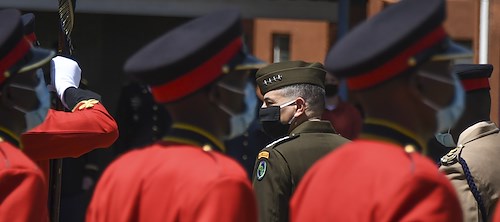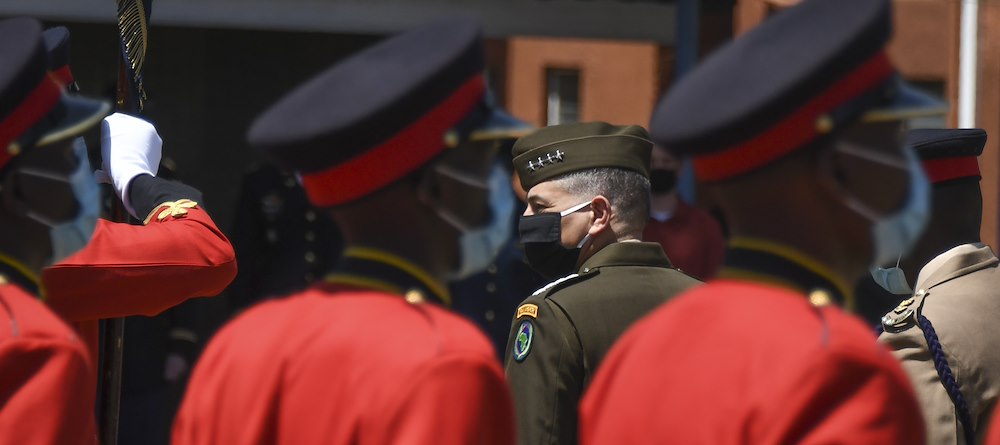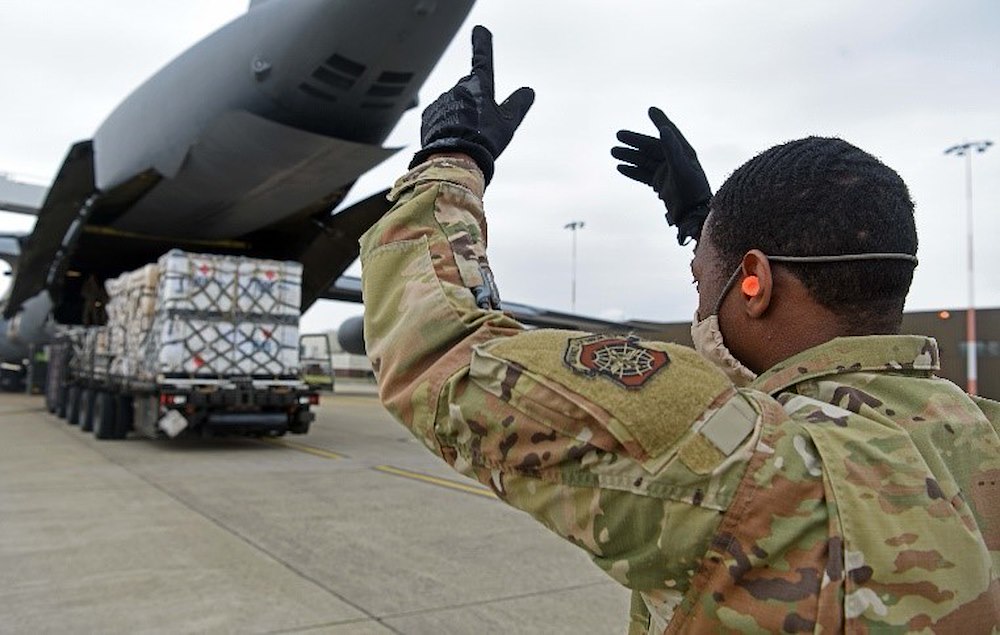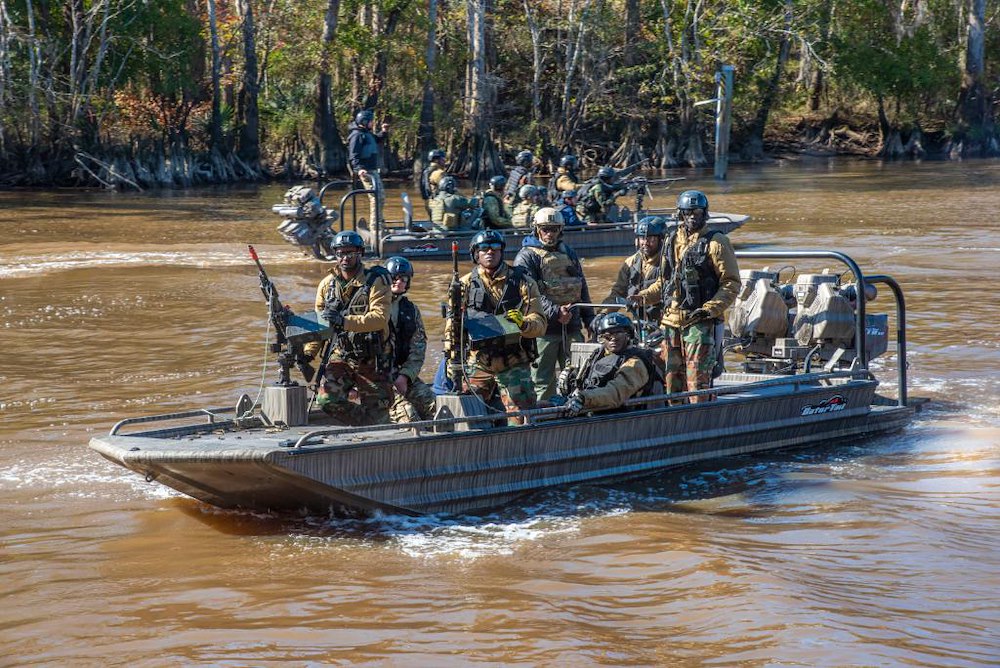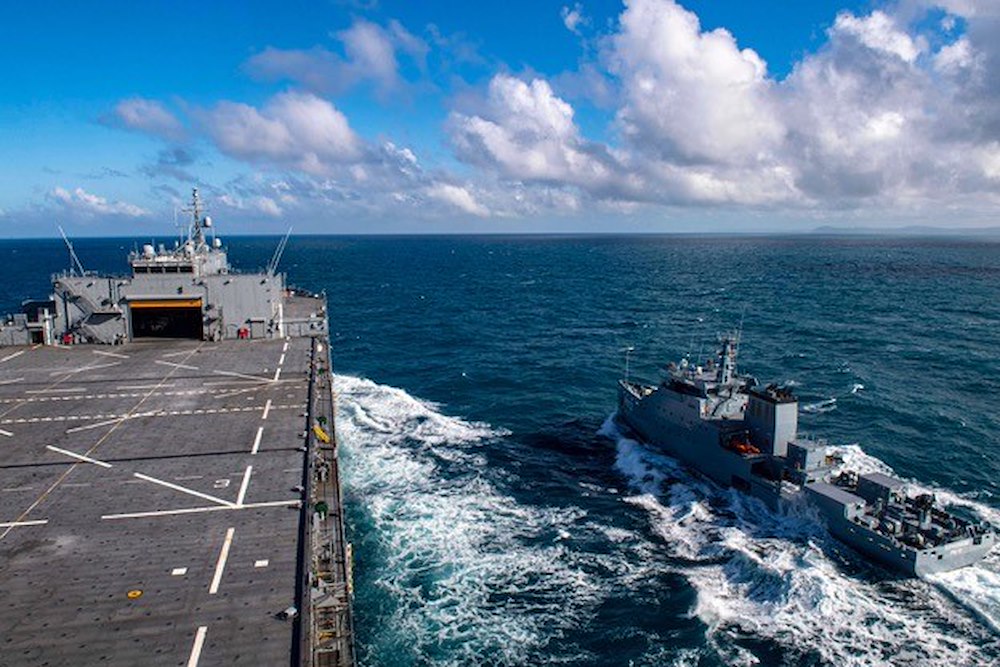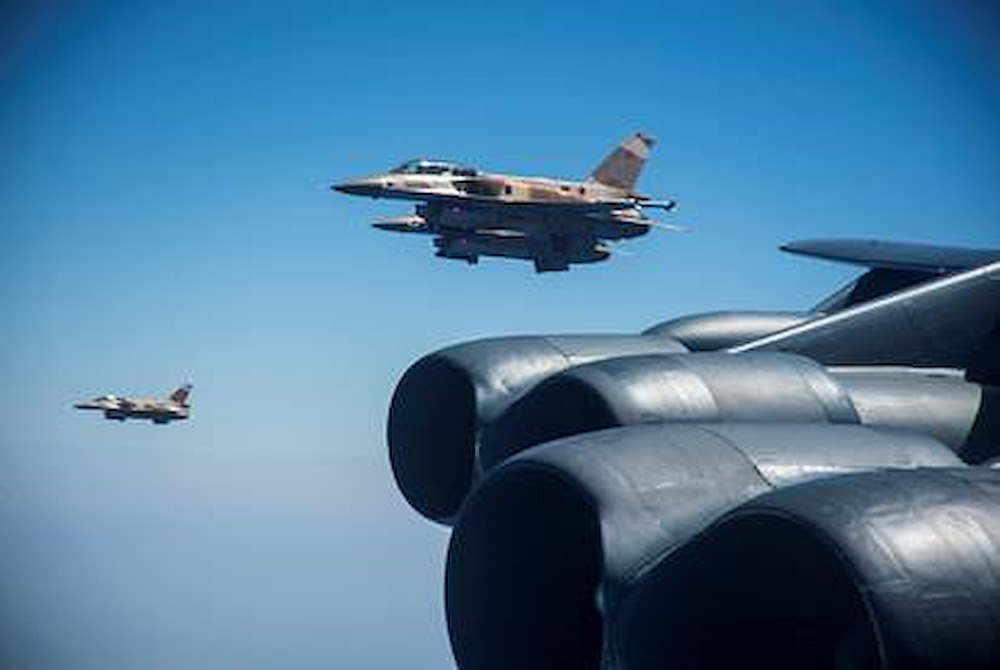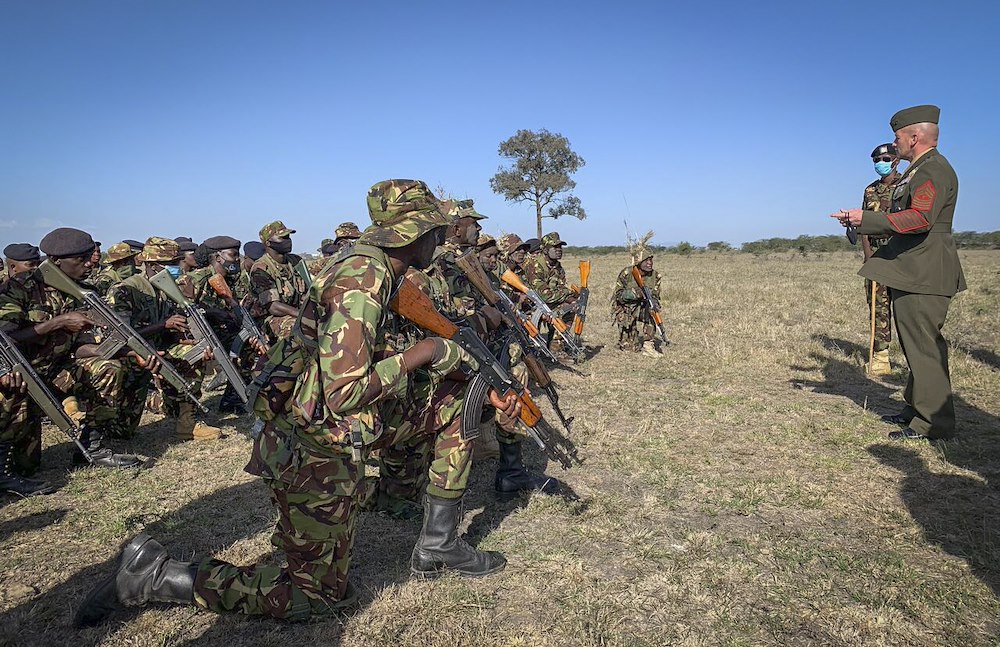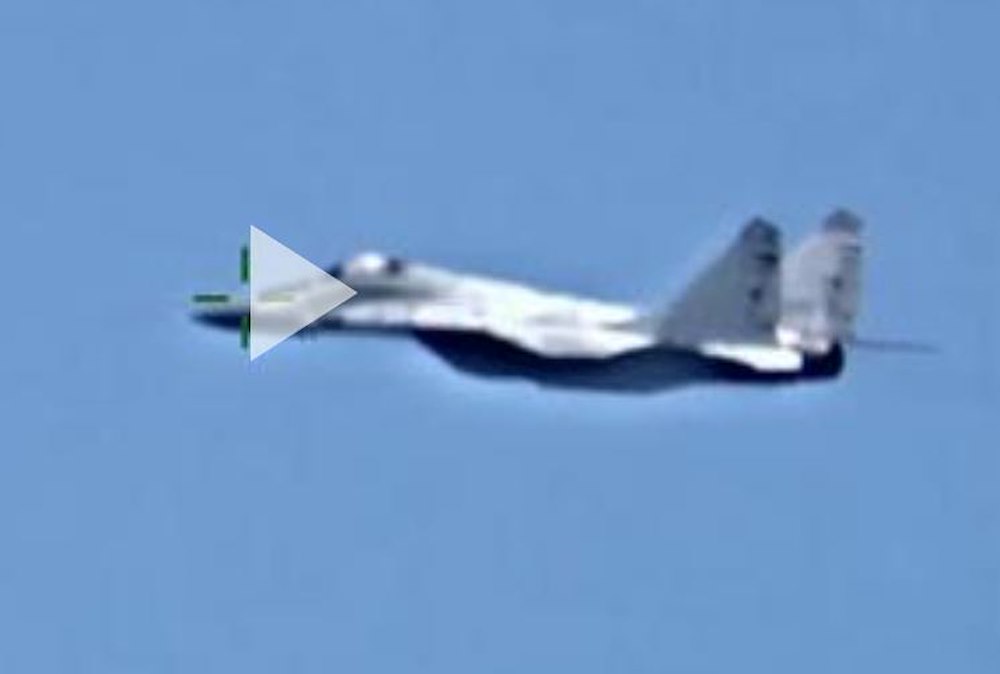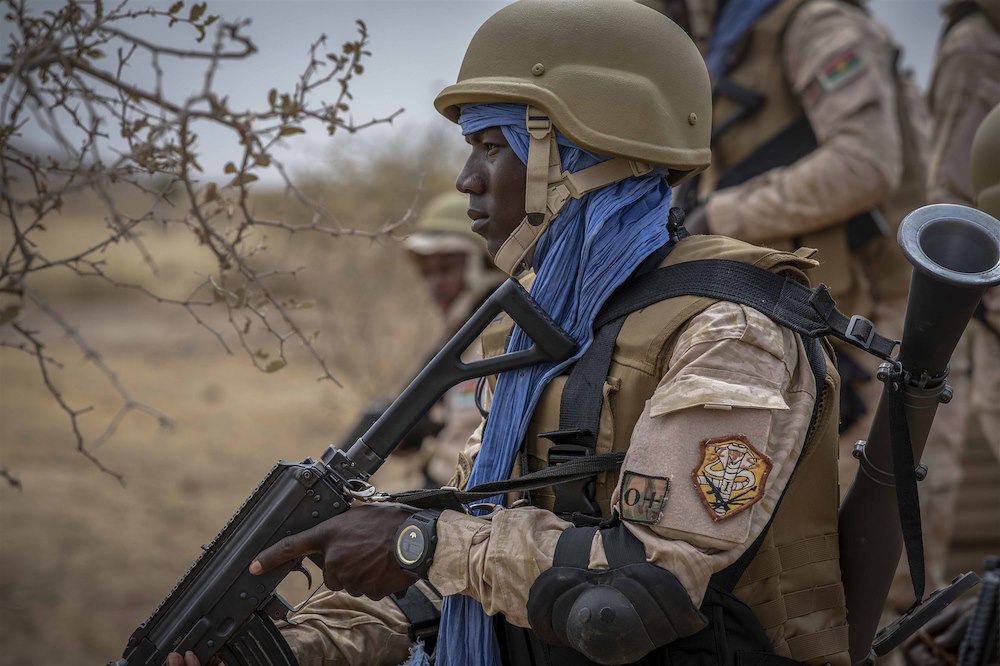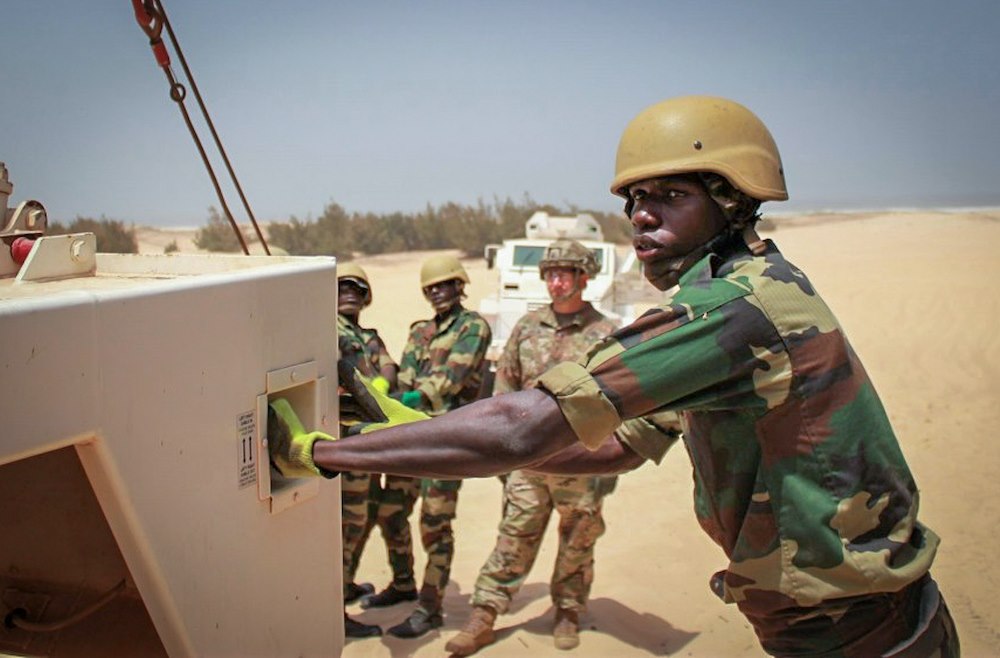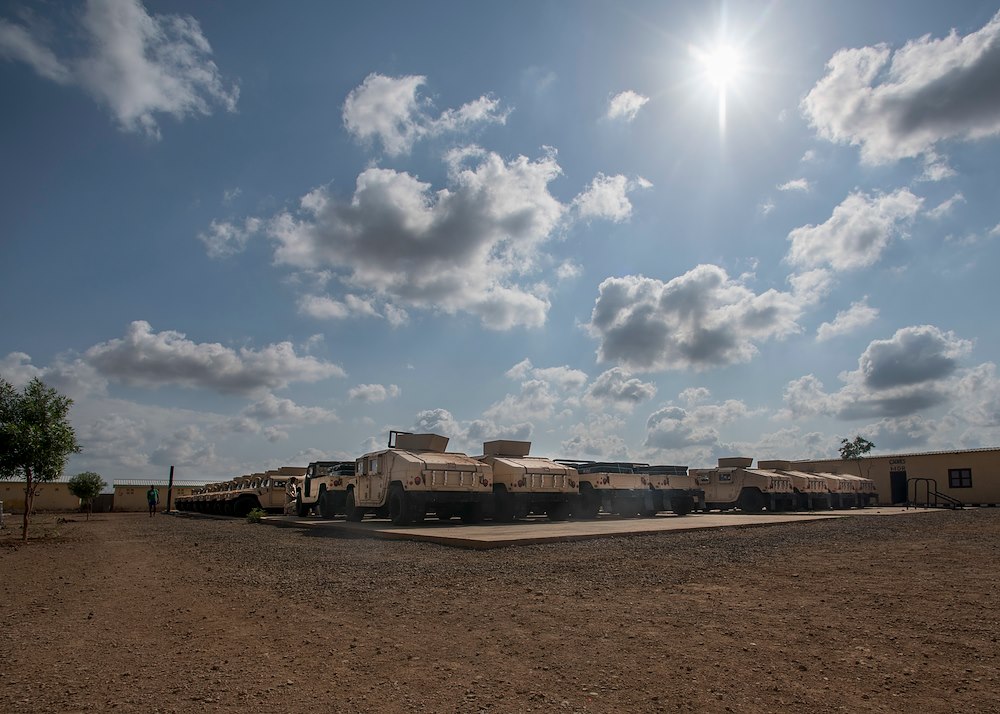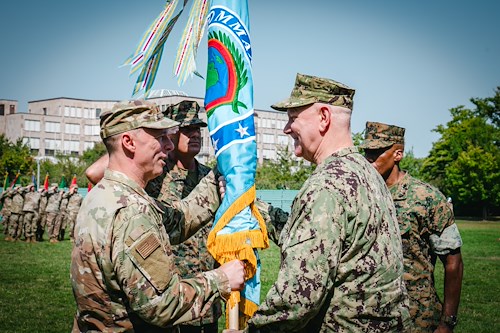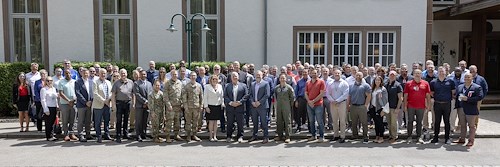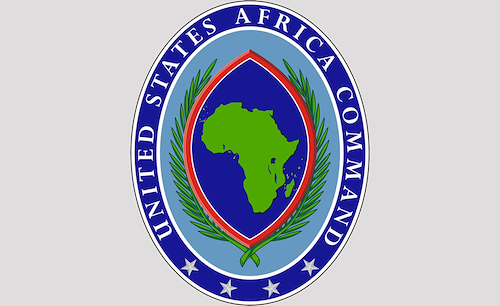Gallery contains 11 images
×
Photo 1 of 11
AFRICOM commander visits key Africa nations to strengthen partnerships, security
U.S. Army Gen. Stephen Townsend, commander, U.S. Africa Command, conducts a pass and review of KDF Soldiers Dec. 15. Townsend and Sgt. Maj. Richard Thresher, command senior enlisted leader, U.S. Africa Command, conducted a four-day trip to Kenya and Djibouti to conduct strategic engagements with partner nation leadership, assess operations and security of U.S. force locations, and demonstrate continued commitment to working with African partners.
Photo by: Col. Jacqueline Breeden
Photo 2 of 11
Logistics challenges, opportunities discussed during Lexington Institute webinar
Staff Sgt. Kalem Postell, 727th Air Mobility Squadron security manager, marshals a K-loader during the loading of pallets and equipment onto a C-5 Super Galaxy assigned to the 9th Airlift Squadron, Dover Air Force Base, Delaware, during a medical cargo mission at RAF Mildenhall, England, April 18, 2020. The 9th AS and the 727th AMS, based at RAF Mildenhall, took part in a mission which involved delivering COVID-19 test kits and other equipment to Accra, Ghana, to be distributed throughout the U.S. African Command area of responsibility. (U.S. Air Force photo by Senior Airman Brandon Esau)
Photo by: USAFE-AFAFRICA Public Affairs
Photo 3 of 11
African partners attend NSCITTS as part of IMET
Photo by: U.S. Africa Command Public Affairs
Photo 4 of 11
USS Hershel “Woody” Williams and Tunisian Navy Exercise Maritime Security Capabilities
201123-N-AO868-1209 MEDITERRANEAN SEA (Nov. 23, 2020) The Tunisian Navy ship OPV Sophonisbe (P613) pulls alongside the Expeditionary Sea Base USS Hershel "Woody" Williams (ESB 4) during a replenishment-at-sea exercise in the Mediterranean Sea, Nov. 23, 2020. Hershel "Woody" Williams is on its inaugural deployment in the U.S. Naval Forces Europe-Africa area of responsibility in support of maritime missions and special operations. (U.S. Navy photo by Mass Communication Specialist Seaman Conner Foy/ Released)
Photo by: U.S. Africa Command Public Affairs
Photo 5 of 11
B-52 Stratofortresses conduct interoperability missions in North Africa
Moroccan F-16's fly alongside a U.S. B-52H Stratofortress assigned to the 5th
Bomb Wing at Minot Air Force Base, North Dakota, during a Bomber Task Force
mission Sept. 7, 2020. Operations and engagements with allies and
partners demonstrate and strengthen shared commitment to global security
and stability.
Photo by: U.S. Air Force photo by Senior Airman Xavier Navarro
Photo 6 of 11
NCO development focus of AFRICOM Senior Enlisted Leader's visit to African nations
Warrant Officer Class One Elijah Koranga, Kenya Defense Forces Sergeant Major, invited Thresher to observe the culminating event of the newly-developed Kenyan Command Course for NCOs – a course implemented by Koranga following an AEDS key leader engagement in the U.S. in March, when he visited NCO academies from each branch of the U.S. Armed Forces.
Photo by: Sgt. 1st Class Aaron Pate
Photo 7 of 11
Russia deploys military fighter aircraft to Libya
Link to download imagery of the Russian aircraft, including video, can be found at the bottom of this page.
Photo by: U.S. Africa Command
Photo 8 of 11
AFRICOM ready for Flintlock 2020
Photo by: U.S. Africa Command Public Affairs
Photo 9 of 11
1st SFAB begins advising mission with vehicle maintenance training in Senegal
Advisers from Logistics Advisor Team 1610, 1st Security Force Assistance Brigade, and soldiers from the Senegalese Armed Forces work side by side during vehicle recovery training March 12, 2020, in Dakar, Senegal. The SAF support United Nations Peacekeeping Operations, and being able to recover a vehicle that breaks down or gets stuck is critically important to their missions. (Courtesy Photo)
Photo 10 of 11
united_states_delivers_md_530f_helicopters_to_kenya_defense_force.jpg
Photo by: U.S. Africa Command Public Affairs
Photo 11 of 11
U.S. delivers Humvees to Djiboutian Armed Forces' Rapid Intervention Battalion
Humvee's sit on helicopter pads waiting to be inventoried at the RIB compound outside Djibouti City, Djibouti, on Dec. 26th. The U.S. delivered 54 Humvees to the RIB as part of a $31 million train-and-equip partnership between the U.S. government and the Djiboutian military. (U.S. Air Force Photo by Senior Airman Codie Trimble)
Photo by: Senior Airman Codie Trimble
Building Partner Capabilities
Beginning in January with the delivery of 54 High Mobility Multipurpose Wheeled Vehicles, known as the Humvee, to the Armed Forces of Djibouti (FAD) for use by its Rapid Intervention Battalion (RIB). The RIB is a FAD advanced infantry battalion, trained and equipped by the Combined Joint Task Force-Horn of Africa.
The U.S. delivered six MD-530F Cayuse Warrior helicopters to the Kenya Army's Joint Helicopter Command at Embakasi Barracks. The helicopters are capable of performing a variety of scout, attack, and close air support missions to enhance Kenyan Defense Force operations. Included with the purchase of the helicopters is a multi-year sustainment package, which will ensure the longevity of the aircraft.
In March, Logistics Advisor Team 1610, 6th Battalion, 1st Security Force Assistance Brigade, delivered a three-week long vehicle maintenance and recovery course in Dakar, Senegal.
“Improving the logistics capabilities of our partners in the Senegalese Armed Forces, to extend their operational reach is an essential task for U.S. Army Africa,” said Col. Layton Dunbar, U.S. Army Africa director of logistics.
The U.S. also transferred ownership of 21 specialized vehicles to the Moroccan Forces Armées Royale Special Operations Company to enhance the company’s capacity to conduct special operations and command and control.
Building partner capability continued in August with a donation of more than $8 million worth of armored personnel carriers to Niger, including maintenance support to aid the West African nation and its G5 Sahel Joint Force partners in the fight against violent extremist organizations.
Multi-National Exercises
Flintlock 20 was the only U.S.-led, annual exercise conducted in 2020 due to COVID-19. The exercise, hosted in Mauritania with an outstation in Senegal, brought together 1,600 service members from 30 African and partner nations. In line with the AFRICOM core mission to strengthen partner capabilities, two African countries – Morocco and Senegal – acted as counterterrorism and regional cooperation trainers themselves; a first since Flintlock’s inception in 2005.
"We are always learning, and every time we come here [Flintlock] we learn something new,” said one African special forces paramedic. “And the things we learn here we apply it in our country and we’re training every day and how to control the victims in the field with my team, we are always doing missions like this."
In addition to tactical combat casualty care, African forces with a shared interest in security in the Sahel refined their individual weapon skills, close-quarters battle, and mission planning.
In 2020 considerable planning (which included mitigation and contingency plans for COVID-19) took place to reintroduce large-scale exercises in 2021, with African Lion, Flintlock 21, Justified Accord, Obangame Express, and Cutlass Express slated to return.
Bringing Partners Together
U.S. Army Gen. Stephen Townsend, AFRICOM commander, conducted several visits to the African continent, including a trip to East Africa in February to assess security measures and strengthen longstanding military relationships. In Kenya Townsend met with U.S. service members to gain a firsthand account of the attack by the al-Shabaab terrorist network at Manda Bay in January.
In June, Townsend accompanied U.S. Ambassador to Libya Richard Norland to a meeting with Libyan Prime Minister Fayez al-Sarraj in Zuwara, Libya. Townsend presented his military perspective on the growing risk of escalation, the dangers posed by Russian-sponsored Wagner operations, and the potential of terrorist groups to exploit the continued conflict for recruitment or attacks.
Throughout the year U.S. Africa Command exploited Russian interference in the Libyan conflict, and the meeting emphasized the U.S. position that peace in Libya must be achieved through the political process, not military means.
In September Townsend met with Tunisian and Algerian leaders, a visit that preceded the solidifying of defense cooperation partnerships in North Africa. Visits to East Africa focused on assessing operations and security of U.S. force locations, and demonstrating continued commitment to working with African partners. During engagement with West African military leadership, Townsend commended the willingness and determination to fight against violent extremist organizations and discussed keys to progress in the Sahel.
In December, U.S. Marine Command Sgt. Maj. Richard D. Thresher, AFRICOM command senior enlisted leader, continued efforts toward the African Enlisted Development Strategy by meeting with Kenya Defense Force leadership and observing the newly-developed Kenyan Command Course for NCOs.
"We will continue to work alongside our partners to develop NCOs in order to build a more capable force,” Thresher said. “A stronger NCO corps has a direct impact on the ability of our partners to increase pressure on violent extremist organizations, which threaten security and stability in the region."
Continued engagement brought about planning for the next iteration of the African Senior Enlisted Leader Conference, hosted in Senegal in July 2021 – the first time the conference will take place in Africa.
Working through the limitations brought on by the spread of COVID-19, the command also innovated to bring countries together through multiple virtual engagements, including the female communication professionals symposium and African Partnership Outbreak Response Alliance.
Airmen assigned to U.S. Air Forces Africa conducted force development training with the Malawian Air Force, building on a partnership dating to 2018 to help build, sustain, and stand-up an independent Air Force. The Malawian Air Force achieved its goal and separated from the Malawian Defense Force in August 2019.
Lastly, the 15th State Partnership in Africa began when the Nebraska National Guard and Rwanda signed their status of forces agreement, cementing their work within the National Guard Bureau’s SPP.
Operations
U.S. Africa Command continued its commitment to working with Somali partners to disrupt al-Shabaab operations and enhance regional security – an unwavering commitment despite the repositioning of U.S. personnel in Somalia, announced late in the year.
“To be clear, the U.S. is not withdrawing or disengaging from East Africa,” Townsend said. “We remain committed to helping our African partners build a more secure future. We also remain capable of striking Al-Shabaab at the time and place of our choosing—they should not test us.”
In partnership with the Federal Government of Somalia, AFRICOM successfully removed several key al-Shabaab leaders to include Bashir Mohamed Mahamoud, aka Bashir Qoorgaab, Yusif Jiis, and Abdulqadir Commandos via precision airstrikes.
In September, U.S. Strategic Command, in support of U.S. Africa Command, conducted a B-52 interoperability-training mission with the Tunisian Air and Moroccan Air Forces over the Mediterranean Sea, highlighting the militaries’ ability to operate jointly.
"Our ability to conduct these missions with our African partners enhances our interoperability and collective responsiveness to ensure security and stability prevails within the African continent,” said U.S. Marine Corps Maj. Gen. Bradford Gering, AFRICOM deputy director of operations.
Maritime support included the deployment of the Expeditionary Sea Base USS Hershel “Woody” Williams, which embarked on its inaugural mission in the AFRICOM area of operations in August.
While deployed the ship conducted six maritime evolutions alongside the Moroccan, Ivoirian, Ghanaian, Nigerian, Cape Verdean, and Senegalese navies, participated in a major multinational exercise, and supported Operation Octave Quartz, a mission designated to reposition forces in Somalia to other East Africa operating locations while maintaining pressure on violent extremists and supporting partner forces.
“The USS Hershel “Woody” Williams enables U.S. forces to execute a multitude of capabilities, including support of theater security operations, maritime domain awareness, and a full spectrum of maritime operations from non-combatant evacuation to high-end warfare,” said Capt. David L. Gray, commanding officer, Hershel “Woody” Williams, blue crew.
In October, the command participated in the successful rescue mission of an American citizen kidnapped by extremists in West Africa.
In November, U.S. Army Europe, Africa consolidated, forming a new command for both U.S. Africa Command and U.S. European Command to support missions across two interconnected theaters of operation.
COVID-19 and Humanitarian Assistance
As coronavirus began its spread, AFRICOM implemented the 3Ds; Distance, Disinfect, and Decision making to protect personnel and host-nation communities and ensure mission success in a COVID-environment.
A whole of government approach enabled multiple humanitarian assistance donations to support African partners also fighting the pandemic.
Early donations to Ghana, Senegal, Uganda, and Rwanda included training and equipment to efficiently and effectively set-up, take down, and operate an UN-Standard Level-II Field Hospital through the African Peacekeeping Rapid Response Partnership program (APRRP).
The supplies and personal protective equipment (PPE) donated to African partners as part of more than 100 donations made to 40 African countries included N95 respirators, face masks, surgical masks, plastic face shields, filtering face-piece masks, surgical gowns, reusable goggles, gloves, boot covers, hospital beds, hand washing stations, hygiene kits, thermometers, and hand sanitizer. The tailored-donations supported specific needs in Africa.

